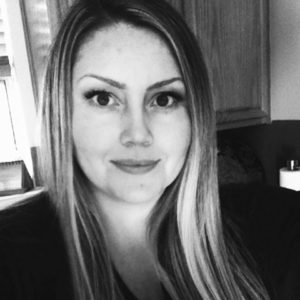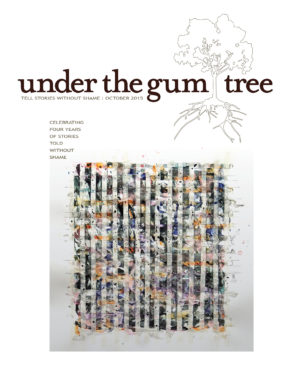Chelsea Schott

Under the Gum Tree is pleased to bring you — a Q&A with Chelsea Schott.
Chelsea teaches literature and writing, and is a recent graduate of Rice University where she is also president of the MLS Writers. Chelsea has had her work published in Germ Magazine, The Winter Tangerine Review, and most recently, Chelsea’s story, “The Frederick Boy” was reviewed by New Pages in junction with our magazine’s summer issue. Read her and our review Here
When and why did you start writing?
Believe it or not, I started writing stories when I was 6 or 7. Writing has always been very natural to me. I seemed to be hearing a “voice” which compelled me to write, to share stories. I still hear that voice—I suppose it’s a muse. Whatever it is, it is more essentially me than myself.
What do you enjoy most about writing?
I really love when I feel like I’ve captured an emotion completely, when I feel like I’ve delivered a punch to my readers. One of my deepest fears is a reader would finish reading my work indifferent. I want readers to feel something intense when they read my work; I hope to inspire love, longing, fear, dread, regret—anything.
Who or what is your biggest inspiration when you write?
Well, the who would be the people who are the subjects of my writing and the what is typically dialogue and setting. In the former, I am fascinated by the impact words have on our conscience, our emotions and our perceptions of people and events. I have found in the latter, a setting of a good story is a character in itself. It remains in the background yet speaks through climate and physical attributes like geography. Sometimes, the presence of geography is more powerful than the protagonist—in a way, it’s God-like.
Do you have a writing schedule?
When I am deep into a piece (most recently I wrote a novel), it’s a full-time job. I don’t worry about word count or pages typically, but I do require a schedule: 4-6 hours alone, in silence, coffee and snacks nearby and absolutely no interruptions. This goes on for six days a week and I force myself to rest on the seventh.
What is the hardest part of writing for you?
Usually, it’s the first hour (or two on a bad day) of writing. My sentences feel sophomoric, unpolished, amateur. I can’t tell you exactly why this happens, but I am fully aware I have to press on through this, then something remarkable occurs—my sentences flow, my voice is mature, intelligent—I transform from banal, technical-speak into fluid poetry. And, at this point I am a slave to the story.
How long does it usually take you to finish a story?
The novel took a little over two months of full-time writing. Short stories take about 2-3 days only because –for reasons I can’t articulate—I must step away from the work for a day or two after its completion and then revisit it. I become objective when I do this and am better able to edit my own work.
Are you working on anything now?
Besides wooing agents, I’m working on a collection of short stories. I plan to put these into a novel-form. After that, I’m going to tackle another longer novel I’ve been working up the courage to write. And, writing is a courageous act.
How many rejections did you get before you had something published? How did you deal with them?
What felt like countless rejections was closer to 15. (According to Submittable.) More painful was the amount of time I spent in obscurity—I went about 10 months unpublished. It was grueling, but I have a close network of writer friends who kept reassuring me that I needed to accept the rejections as part of Greater Author Territory. Rejection, unfortunately, is the norm even for amazing writers, it’s acceptance that is exceptional.
How did you celebrate when you got your first acceptance?
I immediately contacted my writing mentors from Rice University. They had all been my greatest supporters; believing in me when I did not. They had been helping me mature into a creative writer for three years, I owe them everything.
Do you prefer typing or pencil to paper when you write?
Typing. I like to see what it will look like when it is actually read.
What do you do when you’re not writing?
I’m a teacher and a mother. So, young people take up most of my time. And, much of that is spent encouraging them to write well and read better books. When not with them, my time is spent as President of the MLS Writers at Rice University. It’s a group of graduate students who creatively write. We workshop each other’s pieces and host guest speakers—typically published authors and distinguished faculty.
Who is your favorite author?
Hemingway.
What are some of your favorite books?
I tend to favor American men. So, in that respect almost anything from the following: Tobias Wolff, Sherman Alexie, Henry David Thoreau, Langston Hughes, Twain, Arthur Miller, Poe, Fitzgerald, Richard Wright, Tennessee Williams, James Baldwin. The exceptions are Shakespeare, Dickens, Joyce Carol Oates and Joan Didion.
Do you have any advice for other writer?
I’d share the same advice I was given: If you’re truly a writer, then write—no excuses—put away the bullshit. And, never give up—keep submitting, keep workshopping, keep revising, keep editing, fill your house with books and read them!
Is there anything else you would like readers to know?
Yes. You can find more of my work coming out this September. My Other Ex is an anthology written by a collection of women authors detailing true stories of when friendships fail. It’s from the HerStories publishers, Stephanie Sprenger and Jessica Smock. If you love UTGT like I do, you’ll like this book as well.




